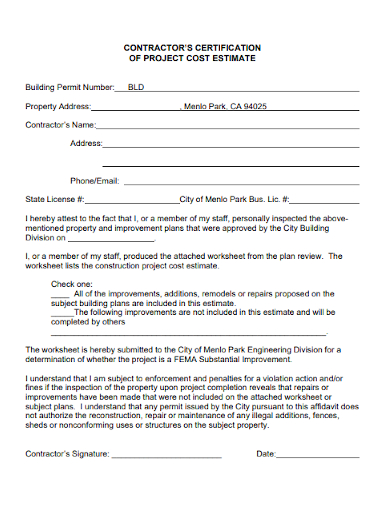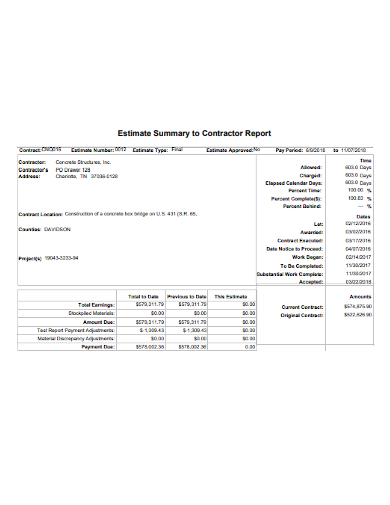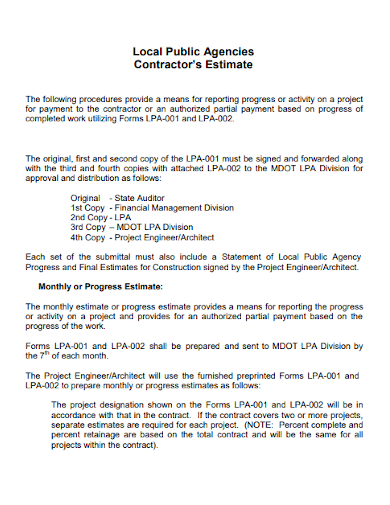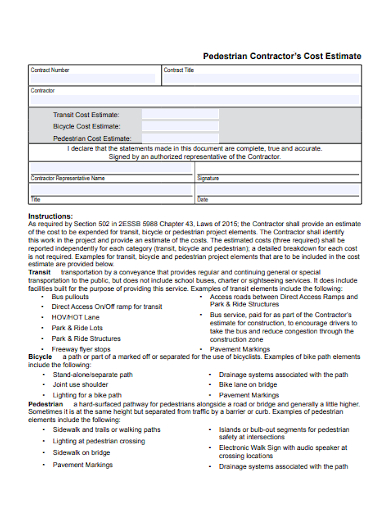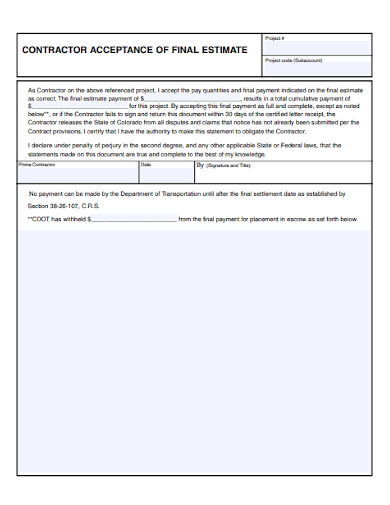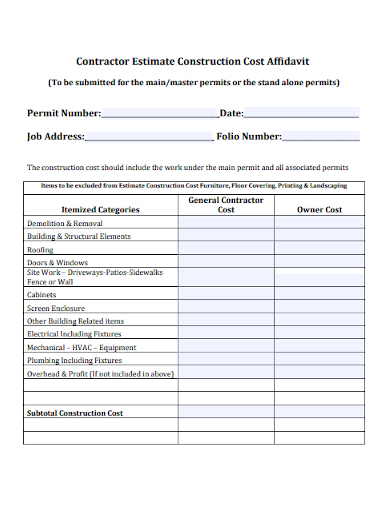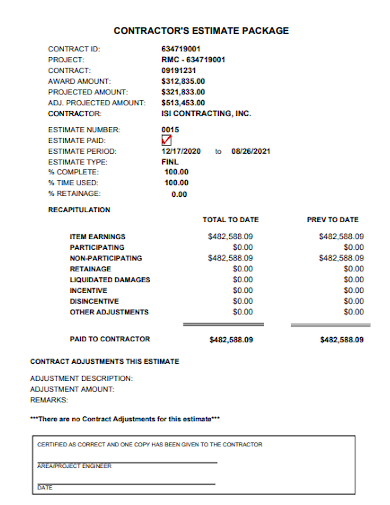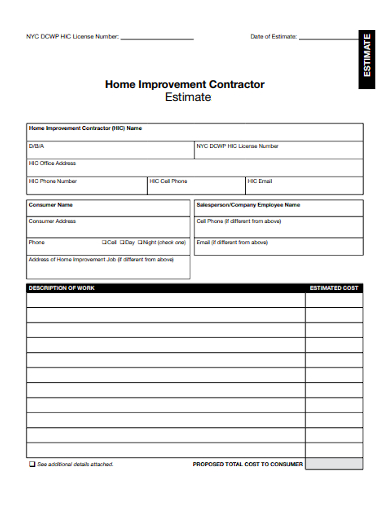In every construction job, part of the main responsibilities a contractor has to do carefully is estimating and submitting bids to win construction projects. Making estimation is a tricky and challenging process, especially for novice contractors since this can make or break their business. A good contractor bids an estimation low enough to win against many competing contractors, while high enough to cover all the actual costs like labor, material, subcontractors, equipment costs, indirect costs, and profit. If you’re struggling to create a good estimation, you’re not alone. It takes time, practice, experience, knowledge, and sometimes even guts to take risks to be good at estimating construction projects. This article will guide you by giving tips on how to estimate for a construction project and providing templates on where you can include your estimation.
10+ Contractor Estimate Samples
1. Contractor Estimate Template
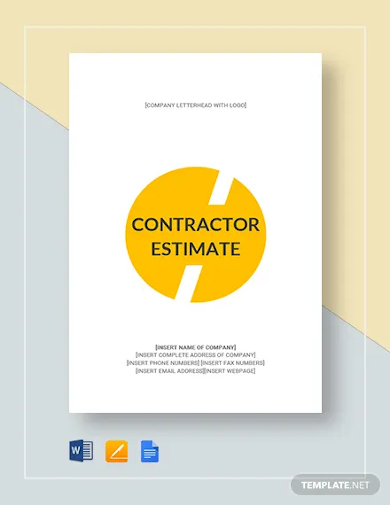
2. Contractor Estimate Sheet Template
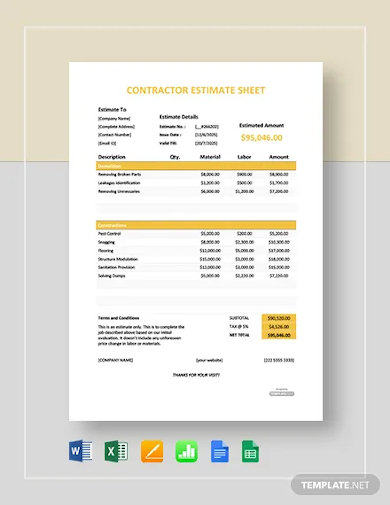
3. Contractor Estimate Form Template
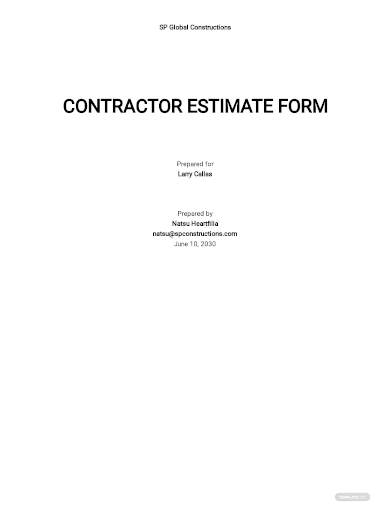
4. Contractor Certifcation of Project Cost Estimate
5. Estimate Summary to Contractor Report
6. Local Public Agencies Contractor’s Estimate
7. Pedestrian Contractor’s Cost Estimate
8. Contractor Acceptance of Final Estimate
9. Contractor Estimate Construction Cost Affidavit
10. Contractor Estimate Package
11. Home Improvement Contractor Estimate
What is Construction Estimating?
Estimating is the process of forecasting the total costs that would take to complete a construction project. An estimate usually contains many factors not shown on the plans and specifications, but it is still required for a construction project. An estimation also needs to include every single item on the plans and in the specifications and every single expenditure associated with the construction project.
Tips to Remember when Estimating for Construction Work
1. Know the Construction Work
Know first what the whole scope of the project entails. This will help you plan for all the requirements needed for the project. You should also familiarize the big and little details of every material, tool, and equipment for the job. You also need to familiarize yourself with the average cost-per-square-foot of common building types in the project’s location so it is easier for you to create a rough estimation. Having a great knowledge of construction work and materials to work on can help you suggest better alternatives to existing specifications.
2. Know the Overhead Costs
Knowing your overhead costs can aid you in building your estimate. Some examples of overhead costs are project bonds, permits, and even general office costs.
3. Don’t Forget the Carrying Costs
Contractors also have to pay for things upfront such as materials, subcontractors, labor before they get reimbursed for it or paid for their work. Make sure to also include them in your estimation process.
4. Consider Business Development
Not a lot of people realize this but it also costs some cash to get a construction job so it’s also important to include the administrative and business development costs when calculating an estimate.
5. Don’t Forget the Profit
Of course, you need to make a profit from all the hard work you will be doing for the project so don’t forget this in your estimation. Find a good balance between adding a high estimate for-profit and a low estimate. If you have a way too high an estimate, your client will refuse to work with you and if you have a low estimate, you won’t earn much from the job.
6. Time
Time is money so make sure your labor costs take into account everyone’s task and how long it will take them to do it. Don’t forget to include this in the estimation.
FAQs
What are the five levels of contractor estimate?
The five levels of contractor estimate are
- Level 1: Order of Magnitude Estimate: This type of estimate is done before the design starts to give the client a rough idea of what a certain project will cost.
- Level 2: Schematic Design Estimate: This type of estimate is done once the general scope of work has been determined.
- Level 3: Design Development Estimate: This type of estimate is done by a professional estimator. The materials, systems, and quantities for the project are included in the estimation.
- Level 4: Construction Document Estimate: This type of estimate is done by the time the project design is complete and documented. This is the final estimation before the real bidding will happen.
- Level 5: Bid Estimate: This is the final estimate and it is based on the published drawing set with final specifications. This is used to compete with other contractors for the job.
How much do contractors charge?
General contractors usually charge about 10 to 20 percent of the total construction project cost and for larger projects, they increase their rates to about 25 percent mark.
Construction estimating is no joke. It takes time and a lot of commitment to push through all the challenges and uncertainty one might face when estimating a project. And estimating is not a one-time task to do during the whole course of the project. As the project progresses along, you need to constantly adjust your estimations to ensure that it will cover all the costs that the project entails. To help you get started making the estimate, download our free sample templates above to use as your guide!
Related Posts
Retirement Speech Samples & Templates
Weekly Schedule Samples & Templates
Contractual Agreement Samples & Templates
FREE 9+ Amazing Sample Church Bulletin Templates in PSD | PDF
Sample Business Card Templates
Sample Cashier Job Descriptions
Questionnaire Samples
FREE 10+ Sample HR Resource Templates in PDF
FREE 10+ HR Consulting Business Plan Samples in MS Word | Google Docs | Pages | PDF
FREE 49+ Sample Job Descriptions in PDF | MS Word
FREE 13+ Academic Calendar Templates in Google Docs | MS Word | Pages | PDF
FREE 10+ How to Create an Executive Summary Samples in Google Docs | MS Word | Pages | PDF
FREE 23+ Sample Event Calendar Templates in PDF | MS Word | Google Docs | Apple Pages
Company Profile Samples
FREE 10+ Leadership Report Samples [ Development, Training, Camp ]

